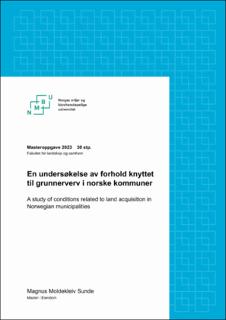| dc.contributor.advisor | Håvard Steinsholt | |
| dc.contributor.author | Sunde, Magnus Moldekleiv | |
| dc.date.accessioned | 2023-07-15T16:28:11Z | |
| dc.date.available | 2023-07-15T16:28:11Z | |
| dc.date.issued | 2023 | |
| dc.identifier | no.nmbu:wiseflow:6839533:54591838 | |
| dc.identifier.uri | https://hdl.handle.net/11250/3079311 | |
| dc.description.abstract | Denne oppgaven er en studie av forhold knyttet til grunnerverv i norske kommuner. Gjennom planlovgivning og ekspropriasjonshjemler er kommunene og fylkeskommunene, i tillegg til Staten, gitt rollen som grunnerverver. Grunnerverv er en forutsetning for samfunnsutvikling i form av anskaffelse av nytt areal til utvikling av infrastruktur, næring, skoler, barnehager, sykehjem, boligbygging, samt idrettsanlegg og friluftsområder. Det er relativt begrenset kunnskap om hvordan grunnerverv blir organisert og utført i kommunene.
Oppgaven søker å belyse forhold knyttet til grunnerverv i norske kommuner. Oppgaven søker også å gi en fremstilling av kommunenes kompetanse, organisering, formål, omfang samt strategier og forhandlinger ved grunnerverv. Oppgaven bygger på både kvalitativ og kvantitativ metode. Hovedmaterialet består av analyse av en spørreskjemaundersøkelse med 92 norske kommuner samt et dybdeintervju med en større norsk kommune. I tillegg bygger oppgaven på masteroppgaven til Krokmogen «Omfang og organisering av grunnerverv i kommuner» (2016) og artikkelen til Steinsholt «Grunnerverv i kommuner» (2005), begge ved Norges miljø- og biovitenskapelige universitet (NMBU).
Resultatene fra undersøkelsen viser at det er ulik kompetanse hos de ansatte med ansvar for grunnerverv i kommunen. Den klare tendensen er at utførelsen og ansvaret for grunnerverv i kommunene i økt grad blir organisert og delegert til større og mer spesialiserte fagmiljø. Kommunene har fortsatt et betydelig behov for å erverve grunn og rettigheter for å anskaffe nytt areal til utvikling og vedlikehold av infrastruktur. Sammenlignet med tidligere undersøkelser, har kommunene påtatt seg en større og mer sentral rolle for å videreutvikle lokalsamfunnet og fungerer i større grad som en markedsaktør. Flertallet av kommunene med eget organ eller egne ansatte som utfører grunnerverv har rutiner og prosedyrer for forhandlinger, mens det motsatte i stor grad gjelder for kommuner uten eget organ eller egne ansatte som utfører grunnerverv.
Likebehandling er en nøkkelfaktor for kommunene. For å sikre dette, har de fleste kommuner etablert egne strategier og prinsipper for prisfastsettelse. Likebehandling er også sentralt i grunnervervsforhandlinger. Dybdeintervjuet som jeg har gjennomført med en større norsk kommune, indikerer at det ikke er vesentlige ulikheter i hvordan den enkelte kommune forhandler med offentlige aktører eller store private aktører versus en «vanlig» grunneier. | |
| dc.description.abstract | This assignment is a study of conditions related to land acquisition in Norwegian municipalities. Through planning legislation and expropriation, municipalities and county municipalities, in addition to the State, have been given the role of land acquirers.
The assignment seeks to shed light on conditions related to land acquisition in Norwegian municipalities. The assignment also seeks to provide a representation of the municipalities' competence, organization, purpose, scope, as well as strategies and negotiations in land acquisition. The assignment is based on both qualitative and quantitative methods. The main material consists of an analysis of a survey of 92 Norwegian municipalities and a in-depth interview with a larger Norwegian municipality. In addition, the assignment is based on Krokmogen's master's thesis "Omfang og organisering av grunnerverv i kommuner" (2016) and Steinsholt's article "Grunnerverv i kommuner" (2005), both at the Norwegian University of Life Sciences (NMBU).
The results of the survey show that there is varying competence among the employees responsible for land acquisition in the municipalities. However, it seems like the execution and responsibility for land acquisition in municipalities are increasingly organized and delegated to larger and more specialized professional environments. Municipalities still have a significant need to acquire land and rights to acquire new areas for the development and maintenance of infrastructure. Compared to previous surveys, municipalities have taken a larger and more central role in further developing the local community and function to a greater extent as a market participant. The majority of municipalities with their own organization or employees performing land acquisition have routines and procedures for negotiations, while the opposite largely applies to municipalities who does not have a organization or employees performing land acquisition.
Equal treatment is a key factor for municipalities. To ensure this, most municipalities have established their own strategies and principles for pricing. Equal treatment is also central in land acquisition negotiations. The in-depth interview I conducted with a larger Norwegian municipality indicates that there are no significant differences in how a municipality negotiates with public sector or large private landowners compared to how they negotiate with a "regular" landowner. | |
| dc.language | nob | |
| dc.publisher | Norwegian University of Life Sciences | |
| dc.title | En undersøkelse av forhold knyttet til grunnerverv i norske kommuner | |
| dc.type | Master thesis | |
